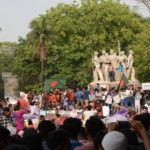Since his recent Gestapo-style abduction, rather than arrest, Shahidul Alam of Bangladesh is no longer a stranger to people, well-beyond the boundaries of his country. Twenty-odd Bangladeshi law-enforcers – all in plainclothes – stormed into his house, destroyed the cc cameras on the premises, neutralized the security guards, and picked him up around midnight on August 5th. By now twelve Nobel laureates and scores of writers, and human rights activists such as Noam Chomsky, Amartya Sen, Joseph Stiglitz, Muhammad Yunus, Arundhati Roy, Gayatri Chakravorty Spivak and among others, three British Labour MPs including Tulip Siddiq – who’s also a niece of Bangladesh PM Sheikh Hasina – consider Alam’s incarceration grossly atrocious and have asked for his immediate release.
His crime? Through a FaceBook posting, he supported the high school students who were on Dhaka streets protesting reckless drivers, one of them had mowed students down, killing two of them in Dhaka on July 29th. Hours before his abduction, this internationally acclaimed photographer and human rights activist told his Al Jazeera interviewer about the authoritarian, corrupt, undemocratic nature of governance in the country. He pointed out that the unelected Hasina regime was engaged in extra-judicial killing of hundreds of suspects, criminals, and political dissidents in Bangladesh. Of late, abductees in the country simply “disappear”, so much so that the judge who refused to grant bail to Alam, told his attorney: “Your client is very fortunate. He hasn’t become a victim of ‘goom’ (mysterious disappearance)!”
In his testimony to court he told the judge how he had been blindfolded and brutalized by law-enforcers. So much so that he himself had to wash his blood-soaked shirt in police custody. One of thousands of victims of unlawful detention is 74-year-old Khaleda Zia – former Prime Minister and President of the main opposition party, the BNP (Bangladesh Nationalist Party). She’s in jail since February on trumped-up charges of “criminal intent of embezzling” a paltry amount from the Zia Orphanage fund (the amount is intact in its bank account); and for her alleged involvement in throwing a Molotov cocktail on a bus at Chauddagram (66 miles off Dhaka) in 2013.
Mahmudur Rahman is among other well-known victims of illegal detention and torture by Hasina government. He’s a BNP supporter and editor of a Bengali daily Amar Desh, which the Government closed down following his arrest. He was not only behind bars for five years without having any formal charges against him but was also brutally tortured in detention. Recently, ruling party goons severely beat him up in the premises of a law-court in presence of police. Apparently, he risked nemesis by publishing a Skype transcript of a questionable conversation between a judge of the so-called International War Crime Tribunal of Bangladesh and a Brussels-based Bangladeshi jurist about the fate of the accused “war criminals”, in his daily. He simply published the Bengali version of the transcript originally published in weekly Economist.
Shafiqur Rehman was another victim. This octogenarian newspaper editor and TV talk-show host, also a BNP sympathizer, was arrested and tortured in custody for his alleged conspiracy to kill Hasina’s powerful son and successor Sajib Wazed Joy. As nothing could be proven against him, he was released after several months of detention. He later fled to the United Kingdom. The Government since the farcical elections of January 2014 has been intimidating and harassing outspoken journalists by filing multiple lawsuits against them, implicating them in seditious activities. One may mention editors of two popular dailies, Daily Starand Prothom Alo, Mahfuz Anam and Motiur Rahman, in this regard.
The widely known gruesome Shapla Massacre, killing of scores of poor madrasa students in the wee hours of May 6th2013 at the Shapla Square in Dhaka is another example of police brutality. The students assembled there to protest alleged blasphemous writings by some bloggers against Prophet Muhammad. While UN Secretary General Ban Ki Moon was concerned at the massacre, US Ambassador Dan Mozina condemned the killing, and cautioned that all groups and individuals had rights to protest.According to New York-based Human Rights Watch, 61 poor madrasa students got killed by police firing on that fateful night in 2013. Last but not least, several BNP and Jamaat leaders, including family members of several executed “war criminals”, are still missing, mysteriously.
Although nothing seems extra-ordinary about the detention and torture of Shahidul Alam, one has reasons to believe Bangladesh has reached the tipping point. The Government’s defiance of so many renowned people’s request to release him apparently reflects Sheikh Hasina’s strength. People might think she’s well-entrenched in her comfort zone, because of Sino-Indian and Russian support. While India was directly involved in installing Hasina to power, it seems the two major arms suppliers to Bangladesh, China and Russia, are least interested in her removal from power.
Seemingly, the US and its allies have remained indifferent to the internal situation of the country, quite for some time. However, the recent night-attack by ruling party activists with handguns on the motorcade of immediate past US Ambassador Marcia Bernicut in Dhaka, which injured one of her security guards, could have been another Benghazi moment for America. It could be a turning point for the Super Power! The vitriol against US administration by the Hasina Government and her party leaders must be least palatable to Washington as well.
Anyway, the flipside of the story about Hasina’s apparent complacency and defiance of public opinion at home and abroad possibly reflects the regime’s moral and psychological bankruptcy. Throughout history, most autocrats on the eve of their abrupt and unceremonious exit, feigned brashness, confidence, and defiance of the mightiest power in the world. Meanwhile, Alam’s immediate family members have demanded his immediate hospitalization as he is having respiratory and eye problems. Instead of giving him medical attention and releasing him unconditionally, the government is treating him as a hardcore criminal, a security threat to the nation.
Evidently, as the Hasina regime relies heavily on Sino-Indian and Russian support, it isn’t likely to release Alam, let alone restore democracy and freedom in Bangladesh. It’s thus essential that the Free-World – if it’s not something that only exists in people’s imagination – should do something proactive to address the problem in the country. It’s time the Free-World support the brave and bold Shahidul Alam as a symbol of democracy and freedom in Bangladesh. He deserves a Nobel Prize for Peace. Nevertheless, he’ll remain a symbol of freedom with or without any prize. He could be another Desmond Tutu, Shirin Ebadi, or Malala Yusufzai, who tried to bring peace and freedom to their countries. They mean a lot to the freedom-loving people across the world and will continue to inspire them in the future.
While Bangladesh is an authoritarian state with a neutered civil society, compliant judiciary, politicised bureaucracy, and biased and ruthless police – all too willing to serve the government – only people like Shahidul Alam provide the flickering hope for the adrift nation. A Nobel Prize for him isn’t for uplifting his image but to acknowledge and glorify courage and integrity, and to condemn tyranny. Hasina’s persecution of Alam and his likes doesn’t reflect her strength and confidence, but her weakness and fear of the unknown. She knows Alam could well be the last straw on her back. In sum, it’s time to bring freedom and justice to Bangladesh by all means, including crippling sanctions against the regime as the Free World is doing to the military junta in Myanmar. The Free-World must honour what Martin Luther King said: “Injustice anywhere is a threat to justice everywhere”!
Frist Published: countercurrents.org











